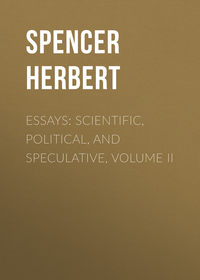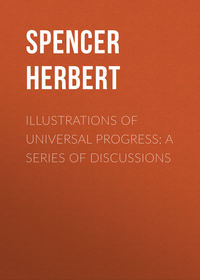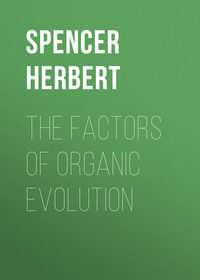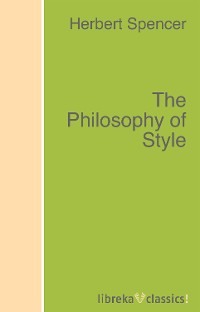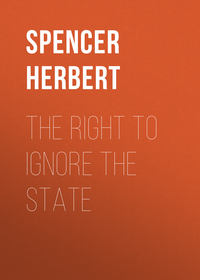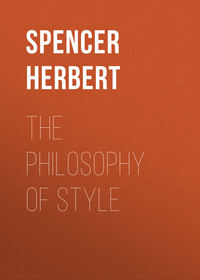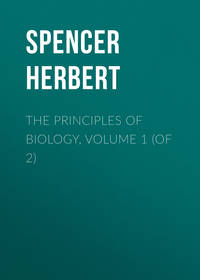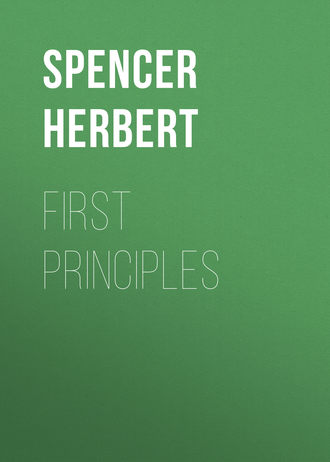 полная версия
полная версияFirst Principles

Herbert Spencer
First Principles
PREFACE
This volume is the first of a series described in a prospectus originally distributed in March, 1860. Of that prospectus, the annexed is a reprint.
A SYSTEM OF PHILOSOPHYMr. Herbert Spencer proposes to issue in periodical parts a connected series of works which he has for several years been preparing. Some conception of the general aim and scope of this series may be gathered from the following Programme.
FIRST PRINCIPLESPart I. The Unknowable. – Carrying a step further the doctrine put into shape by Hamilton and Mansel; pointing out the various directions in which Science leads to the same conclusions; and showing that in this united belief in an Absolute that transcends not only human knowledge but human conception, lies the only possible reconciliation of Science and Religion.
Part II. Laws of the Knowable. – A statement of the ultimate principles discernible throughout all manifestations of the Absolute – those highest generalizations now being disclosed by Science which are severally true not of one class of phenomena but of all classes of phenomena; and which are thus the keys to all classes of phenomena.1
[In logical order should here come the application of these First Principles to Inorganic Nature. But this great division it is proposed to pass over: partly because, even without it, the scheme is too extensive; and partly because the interpretation of Organic Nature after the proposed method, is of more immediate importance. The second work of the series will therefore be– ]
THE PRINCIPLES OF BIOLOGYVol. IPart I. The Data of Biology. – Including those general truths of Physics and Chemistry with which rational Biology must set out.
II. The Inductions of Biology. – A statement of the leading generalizations which Naturalists, Physiologists, and Comparative Anatomists, have established.
III. The Evolution of Life. – Concerning the speculation commonly known as “The Development Hypothesis” – its à priori and à posteriori evidences.
Vol. IIIV. Morphological Development. – Pointing out the relations that are everywhere traceable between organic forms and the average of the various forces to which they are subject; and seeking in the cumulative effects of such forces a theory of the forms.
V. Physiological Development. – The progressive differentiation of functions similarly traced; and similarly interpreted as consequent upon the exposure of different parts of organisms to different sets of conditions.
VI. The Laws of Multiplication. – Generalizations respecting the rates of reproduction of the various classes of plants and animals; followed by an attempt to show the dependence of these variations upon certain necessary causes.2
THE PRINCIPLES OF PSYCHOLOGYVol. IPart I. The Data of Psychology. – Treating of the general connexions of Mind and Life and their relations to other modes of the Unknowable.
II. The Inductions of Psychology. – A digest of such generalizations respecting mental phenomena as have already been empirically established.
III. General Synthesis. – A republication, with additional chapters, of the same part in the already-published The Principles of Psychology.
IV. Special Synthesis. – A republication, with extensive revisions and additions, of the same part, &c. &c.
V. Physical Synthesis. – An attempt to show the manner in which the succession of states of consciousness conforms to a certain fundamental law of nervous action that follows from the First Principles laid down at the outset.
Vol. IIVI. Special Analysis. – As at present published, but further elaborated by some additional chapters.
VII. General Analysis. – As at present published, with several explanations and additions.
VIII. Corollaries. – Consisting in part of a number of derivative principles which form a necessary introduction to Sociology.3
THE PRINCIPLES OF SOCIOLOGYVol. IPart I. The Data of Sociology. – A statement of the several sets of factors entering into social phenomena – human ideas and feelings considered in their necessary order of evolution; surrounding natural conditions; and those ever complicating conditions to which Society itself gives origin.
II. The Inductions of Sociology. – General facts, structural and functional, as gathered from a survey of Societies and their changes: in other words, the empirical generalizations that are arrived at by comparing different societies, and successive phases of the same society.
III. Political Organization. – The evolution of governments, general and local, as determined by natural causes; their several types and metamorphoses; their increasing complexity and specialization; and the progressive limitation of their functions.
Vol. IIIV. Ecclesiastical Organization. – Tracing the differentiation of religious government from secular; its successive complications and the multiplication of sects; the growth and continued modification of religious ideas, as caused by advancing knowledge and changing moral character; and the gradual reconciliation of these ideas with the truths of abstract science.
V. Ceremonial Organization. – The natural history of that third kind of government which, having a common root with the others, and slowly becoming separate from and supplementary to them, serves to regulate the minor actions of life.
VI. Industrial Organization. – The development of productive and distributive agencies, considered, like the foregoing, in its necessary causes: comprehending not only the progressive division of labour, and the increasing complexity of each industrial agency, but also the successive forms of industrial government as passing through like phases with political government.
Vol. IIIVII. Lingual Progress. – The evolution of Languages regarded as a psychological process determined by social conditions.
VIII. Intellectual Progress. – Treated from the same point of view: including the growth of classifications; the evolution of science out of common knowledge; the advance from qualitative to quantitative prevision, from the indefinite to the definite, and from the concrete to the abstract.
IX. Æsthetic Progress. – The Fine Arts similarly dealt with: tracing their gradual differentiation from primitive institutions and from each other; their increasing varieties of development; and their advance in reality of expression and superiority of aim.
X. Moral Progress. – Exhibiting the genesis of the slow emotional modifications which human nature undergoes in its adaptation to the social state.
XI. The Consensus. – Treating of the necessary interdependence of structures and of functions in each type of society, and in the successive phases of social development.4
THE PRINCIPLES OF MORALITYVol. IPart I. The Data of Morality. – Generalizations furnished by Biology, Psychology and Sociology, which underlie a true theory of right living: in other words, the elements of that equilibrium between constitution and conditions of existence, which is at once the moral ideal and the limit towards which we are progressing.
II. The Inductions of Morality. – Those empirically-established rules of human action which are registered as essential laws by all civilized nations: that is to say – the generalizations of expediency.
III. Personal Morals. – The principles of private conduct – physical, intellectual, moral and religious – that follow from the conditions to complete individual life: or, what is the same thing – those modes of private action which must result from the eventual equilibration of internal desires and external needs.
Vol. IIIV. Justice. – The mutual limitations of men’s actions necessitated by their co-existence as units of a society – limitations, the perfect observance of which constitutes that state of equilibrium forming the goal of political progress.
V. Negative Beneficence. – Those secondary limitations, similarly necessitated, which, though less important and not cognizable by law, are yet requisite to prevent mutual destruction of happiness in various indirect ways: in other words – those minor self-restraints dictated by what may be called passive sympathy.
VI. Positive Beneficence. – Comprehending all modes of conduct, dictated by active sympathy, which imply pleasure in giving pleasure – modes of conduct that social adaptation has induced and must render ever more general; and which, in becoming universal, must fill to the full the possible measure of human happiness.5
In anticipation of the obvious criticism that the scheme here sketched out is too extensive, it may be remarked that an exhaustive treatment of each topic is not intended; but simply the establishment of principles, with such illustrations as are needed to make their bearings fully understood. It may also be pointed out that, besides minor fragments, one large division (The Principles of Psychology) is already, in great part, executed. And a further reply is, that impossible though it may prove to execute the whole, yet nothing can be said against an attempt to set forth the First Principles and to carry their applications as far as circumstances permit.
The price per Number to be half-a-crown; that is to say, the four Numbers yearly issued to be severally delivered, post free, to all annual subscribers of Ten Shillings.
This Programme I have thought well to reprint for two reasons: – the one being that readers may, from time to time, be able to ascertain what topics are next to be dealt with; the other being that an outline of the scheme may remain, in case it should never be completed.
The successive instalments of which this volume consists, were issued to the subscribers at the following dates: – Part I. (pp. 1–80) in October, 1860; Part II. (pp. 81–176) in January, 1861; Part III. (pp. 177–256) in April, 1861; Part IV. (pp. 257–334) in October, 1861; Part V. (pp. 335–416) in March, 1862; and Part VI. (pp. 417–504) in June, 1862.
London, June 5th, 1862PART I.
THE UNKNOWABLE
CHAPTER I.
RELIGION AND SCIENCE
§ 1. We too often forget that not only is there “a soul of goodness in things evil,” but very generally also, a soul of truth in things erroneous. While many admit the abstract probability that a falsity has usually a nucleus of reality, few bear this abstract probability in mind, when passing judgment on the opinions of others. A belief that is finally proved to be grossly at variance with fact, is cast aside with indignation or contempt; and in the heat of antagonism scarcely any one inquires what there was in this belief which commended it to men’s minds. Yet there must have been something. And there is reason to suspect that this something was its correspondence with certain of their experiences: an extremely limited or vague correspondence perhaps; but still, a correspondence. Even the absurdest report may in nearly every instance be traced to an actual occurrence; and had there been no such actual occurrence, this preposterous misrepresentation of it would never have existed. Though the distorted or magnified image transmitted to us through the refracting medium of rumour, is utterly unlike the reality; yet in the absence of the reality there would have been no distorted or magnified image. And thus it is with human beliefs in general. Entirely wrong as they may appear, the implication is that they germinated out of actual experiences – originally contained, and perhaps still contain, some small amount of verity.
More especially may we safely assume this, in the case of beliefs that have long existed and are widely diffused; and most of all so, in the case of beliefs that are perennial and nearly or quite universal. The presumption that any current opinion is not wholly false, gains in strength according to the number of its adherents. Admitting, as we must, that life is impossible unless through a certain agreement between internal convictions and external circumstances; admitting therefore that the probabilities are always in favour of the truth, or at least the partial truth, of a conviction; we must admit that the convictions entertained by many minds in common are the most likely to have some foundation. The elimination of individual errors of thought, must give to the resulting judgment a certain additional value. It may indeed be urged that many widely-spread beliefs are received on authority; that those entertaining them make no attempts at verification; and hence it may be inferred that the multitude of adherents adds but little to the probability of a belief. But this is not true. For a belief which gains extensive reception without critical examination, is thereby proved to have a general congruity with the various other beliefs of those who receive it; and in so far as these various other beliefs are based upon personal observation and judgment, they give an indirect warrant to one with which they harmonize. It may be that this warrant is of small value; but still it is of some value.
Could we reach definite views on this matter, they would be extremely useful to us. It is important that we should, if possible, form something like a general theory of current opinions; so that we may neither over-estimate nor under-estimate their worth. Arriving at correct judgments on disputed questions, much depends on the attitude of mind we preserve while listening to, or taking part in, the controversy; and for the preservation of a right attitude, it is needful that we should learn how true, and yet how untrue, are average human beliefs. On the one hand, we must keep free from that bias in favour of received ideas which expresses itself in such dogmas as “What every one says must be true,” or “The voice of the people is the voice of God.” On the other hand, the fact disclosed by a survey of the past, that majorities have usually been wrong, must not blind us to the complementary fact, that majorities have usually not been entirely wrong. And the avoidance of these extremes being a prerequisite to catholic thinking, we shall do well to provide ourselves with a safe-guard against them, by making a valuation of opinions in the abstract. To this end we must contemplate the kind of relation that ordinarily subsists between opinions and facts. Let us do so with one of those beliefs which under various forms has prevailed among all nations in all times.
§ 2. The earliest traditions represent rulers as gods or demigods. By their subjects, primitive kings were regarded as superhuman in origin, and superhuman in power. They possessed divine titles; received obeisances like those made before the altars of deities; and were in some cases actually worshipped. If there needs proof that the divine and half-divine characters originally ascribed to monarchs were ascribed literally, we have it in the fact that there are still existing savage races, among whom it is held that the chiefs and their kindred are of celestial origin, or, as elsewhere, that only the chiefs have souls. And of course along with beliefs of this kind, there existed a belief in the unlimited power of the ruler over his subjects – an absolute possession of them, extending even to the taking of their lives at will: as even still in Fiji, where a victim stands unbound to be killed at the word of his chief; himself declaring, “whatever the king says must be done.”
In times and among races somewhat less barbarous, we find these beliefs a little modified. The monarch, instead of being literally thought god or demigod, is conceived to be a man having divine authority, with perhaps more or less of divine nature. He retains however, as in the East to the present day, titles expressing his heavenly descent or relationships; and is still saluted in forms and words as humble as those addressed to the Deity. While the lives and properties of his people, if not practically so completely at his mercy, are still in theory supposed to be his.
Later in the progress of civilization, as during the middle ages in Europe, the current opinions respecting the relationship of rulers and ruled are further changed. For the theory of divine origin, there is substituted that of divine right. No longer god or demigod, or even god-descended, the king is now regarded as simply God’s vice-gerent. The obeisances made to him are not so extreme in their humility; and his sacred titles lose much of their meaning. Moreover his authority ceases to be unlimited. Subjects deny his right to dispose at will of their lives and properties; and yield allegiance only in the shape of obedience to his commands.
With advancing political opinion has come still greater restriction of imperial power. Belief in the supernatural character of the ruler, long ago repudiated by ourselves for example, has left behind it nothing more than the popular tendency to ascribe unusual goodness, wisdom, and beauty to the monarch. Loyalty, which originally meant implicit submission to the king’s will, now means a merely nominal profession of subordination, and the fulfilment of certain forms of respect. Our political practice, and our political theory, alike utterly reject those regal prerogatives which once passed unquestioned. By deposing some, and putting others in their places, we have not only denied the divine rights of certain men to rule; but we have denied that they have any rights beyond those originating in the assent of the nation. Though our forms of speech and our state-documents still assert the subjection of the citizens to the ruler, our actual beliefs and our daily proceedings implicitly assert the contrary. We obey no laws save those of our own making. We have entirely divested the monarch of legislative power; and should immediately rebel against his or her exercise of such power, even in matters of the smallest concern. In brief, the aboriginal doctrine is all but extinct among us.
Nor has the rejection of primitive political beliefs, resulted only in transferring the authority of an autocrat to a representative body. The views entertained respecting governments in general, of whatever form, are now widely different from those once entertained. Whether popular or despotic, governments were in ancient times supposed to have unlimited authority over their subjects. Individuals existed for the benefit of the State; not the State for the benefit of individuals. In our days, however, not only has the national will been in many cases substituted for the will of the king; but the exercise of this national will has been restricted to a much smaller sphere. In England, for instance, though there has been established no definite theory setting bounds to governmental authority; yet, in practice, sundry bounds have been set to it which are tacitly recognized by all. There is no organic law formally declaring that the legislature may not freely dispose of the citizens’ lives, as early kings did when they sacrificed hecatombs of victims; but were it possible for our legislature to attempt such a thing, its own destruction would be the consequence, rather than the destruction of citizens. How entirely we have established the personal liberties of the subject against the invasions of State-power, would be quickly demonstrated, were it proposed by Act of Parliament forcibly to take possession of the nation, or of any class, and turn its services to public ends; as the services of the people were turned by primitive rulers. And should any statesman suggest a re-distribution of property such as was sometimes made in ancient democratic communities, he would be met by a thousand-tongued denial of imperial power over individual possessions. Not only in our day have these fundamental claims of the citizen been thus made good against the State, but sundry minor claims likewise. Ages ago, laws regulating dress and mode of living fell into disuse; and any attempt to revive them would prove the current opinion to be, that such matters lie beyond the sphere of legal control. For some centuries we have been asserting in practice, and have now established in theory, the right of every man to choose his own religious beliefs, instead of receiving such beliefs on State-authority. Within the last few generations we have inaugurated complete liberty of speech, in spite of all legislative attempts to suppress or limit it. And still more recently we have claimed and finally obtained under a few exceptional restrictions, freedom to trade with whomsoever we please. Thus our political beliefs are widely different from ancient ones, not only as to the proper depositary of power to be exercised over a nation, but also as to the extent of that power.
Not even here has the change ended. Besides the average opinions which we have just described as current among ourselves, there exists a less widely-diffused opinion going still further in the same direction. There are to be found men who contend that the sphere of government should be narrowed even more than it is in England. The modern doctrine that the State exists for the benefit of citizens, which has now in a great measure supplanted the ancient doctrine that the citizens exist for the benefit of the State, they would push to its logical results. They hold that the freedom of the individual, limited only by the like freedom of other individuals, is sacred; and that the legislature cannot equitably put further restrictions upon it, either by forbidding any actions which the law of equal freedom permits, or taking away any property save that required to pay the cost of enforcing this law itself. They assert that the sole function of the State is the protection of persons against each other, and against a foreign foe. They urge that as, throughout civilization, the manifest tendency has been continually to extend the liberties of the subject, and restrict the functions of the State, there is reason to believe that the ultimate political condition must be one in which personal freedom is the greatest possible and governmental power the least possible: that, namely, in which the freedom of each has no limit but the like freedom of all; while the sole governmental duty is the maintenance of this limit.
Here then in different times and places we find concerning the origin, authority, and functions of government, a great variety of opinions – opinions of which the leading genera above indicated subdivide into countless species. What now must be said about the truth or falsity of these opinions? Save among a few barbarous tribes the notion that a monarch is a god or demigod is regarded throughout the world as an absurdity almost passing the bounds of human credulity. In but few places does there survive a vague notion that the ruler possesses any supernatural attributes. Most civilized communities, which still admit the divine right of governments, have long since repudiated the divine right of kings. Elsewhere the belief that there is anything sacred in legislative regulations is dying out: laws are coming to be considered as conventional only. While the extreme school holds that governments have neither intrinsic authority, nor can have authority given to them by convention; but can possess authority only as the administrators of those moral principles deducible from the conditions essential to social life. Of these various beliefs, with their innumerable modifications, must we then say that some one alone is wholly right and all the rest wholly wrong; or must we say that each of them contains truth more or less completely disguised by errors? The latter alternative is the one which analysis will force upon us. Ridiculous as they may severally appear to those not educated under them, every one of these doctrines has for its vital element the recognition of an unquestionable fact. Directly or by implication, each of them insists on a certain subordination of individual actions to social requirements. There are wide differences as to the power to which this subordination is due; there are wide differences as to the motive for this subordination; there are wide differences as to its extent; but that there must be some subordination all are agreed. From the oldest and rudest idea of allegiance, down to the most advanced political theory of our own day, there is on this point complete unanimity. Though, between the savage who conceives his life and property to be at the absolute disposal of his chief, and the anarchist who denies the right of any government, autocratic or democratic, to trench upon his individual freedom, there seems at first sight an entire and irreconcilable antagonism; yet ultimate analysis discloses in them this fundamental community of opinion; that there are limits which individual actions may not transgress – limits which the one regards as originating in the king’s will, and which the other regards as deducible from the equal claims of fellow-citizens.


